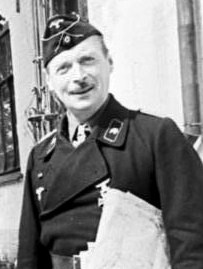Hyazinth Graf Strachwitz
| Hyacinth Graf Strachwitz von Groß-Zauche und Camminetz | |
|---|---|

Strachwitz as Oberst and commander of Panzer-Regiment "Großdeutschland", June 1943
|
|
| Nickname(s) | Conté, Der Panzergraf |
| Born |
30 July 1893 Groß Stein, Province of Silesia, Kingdom of Prussia, German Empire (now Kamień Śląski, Opole Voivodeship, Poland) |
| Died | 25 April 1968 (aged 74) Trostberg, Bavaria, West Germany |
| Buried | Cemetery in Grabenstätt |
| Allegiance |
|
| Service/branch |
Prussian Army Army |
| Years of service | 1912–45 |
| Rank | Generalleutnant of the Reserves |
| Service number | |
| Unit | |
| Commands held | Panzer-Regiment "Großdeutschland" |
| Battles/wars |
See battles
|
| Awards | Ritterkreuz des Eisernen Kreuzes mit Eichenlaub, Schwertern und Brillanten |
| Other work | Land owner and farmer, and military advisor |
Hyacinth Graf Strachwitz von Groß-Zauche und Camminetz (30 July 1893 – 25 April 1968) was a German Army officer of aristocratic descent. Strachwitz saw action in World War I, but rose to fame for his command of armoured forces in World War II. For these services he was awarded the Knight's Cross of the Iron Cross with Oak Leaves, Swords and Diamonds (German: Ritterkreuz des Eisernen Kreuzes mit Eichenlaub, Schwertern und Brillanten), an award created to recognise extreme battlefield bravery or outstanding military leadership. At the time of its presentation to Strachwitz it was Germany's highest military decoration.
Strachwitz was born in 1893 on his family estate in Silesia. He was educated at various Prussian military academies and served with distinction as a cavalry officer in the opening weeks of World War I. He was captured by the French in October 1914. He was nearly shot as a spy after he was caught wearing civilian clothes, but was later sentenced to forced labour. He attempted to escape several times, but was unsuccessful, and returned to Germany after the war ended in late 1918. In the aftermath of World War I, Strachwitz fought with the Freikorps in the Spartacist uprising of the German Revolution in Berlin, and in the Silesian Uprisings against the Poles and Polish Silesians of Upper Silesia. In the mid-1920s he took over the family estate, Groß Stein, from his father and became a member of the Nazi Party and the Allgemeine SS. He remained an officer in the reserves, and participated in various military exercises during the 1930s.
...
Wikipedia
